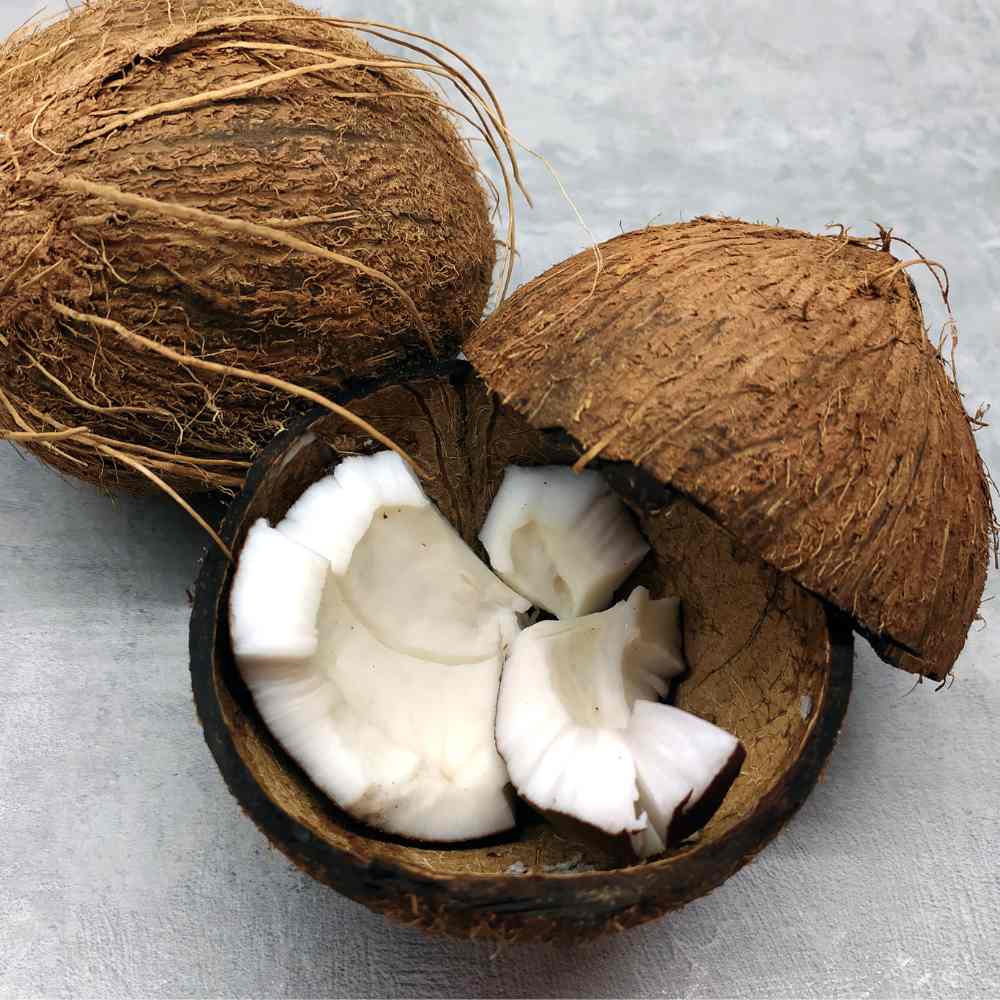
Does Coconut Oil Clog Pores? A Dermatologist Answers!
Are you following the latest TikTok trend and putting coconut oil on your face? Does the thought of it make your skin tingle with delight at the prospect of being saturated in its creamy goodness?
Well, before you slather yourself in coconut oil, there is something to consider – does coconut oil clog pores?
In this post we'll dive into this age-old question and examine what science tells us. We will uncover the truth about if coconut oils effects on facial pores.
Come along as we do some detective work together and even consult dermatologists about this latest skincare trend. But first, where does this magical oil come from?

Where Does Coconut Oil Come From?
Where does this oil that people are slathering on their faces actually come from? It's actually quite interesting!
Coconut oil is produced by pressing the edible white flesh found inside the shell. The flesh itself can be picked fresh from a mature coconut, or used dried (copra). To produce the oil, producers either use an expeller-pressing method or a wet-milling process.
In expeller-pressed coconut oil production, coconuts are first de-husked and cut in half before being dried. Producers then grind up these newly formed flakes into smaller pieces before putting it through cold press extraction methods such as screw presses or hydraulic presses.
This technique extracts the oils without generating any heat which could damage its nutritional quality. This type of production also creates both refined and unrefined versions depending on what additional filtration processes are applied after pressing takes place.
The wet-milling process uses raw coconuts that have been selected primarily for their higher water content—perfect for producing copra, which can later be processed into oil via high temperature mechanical techniques such as boiling or frying in hot presses.
Afterward, solvents like hexane may be used to draw out any remaining impurities from the material so that only ultra pure coconut butter remains at the end of this step. It’s called "virgin" because no other chemicals were added during production.
Coconut Oil's Fatty Acids
Raw coconut oil is derived from the meat of mature coconuts and is prized for its high concentration of fatty acids, such as lauric acid, capric acid, and caprylic acid.
These medium chain fatty acids contribute to coconut oil's moisturizing, antimicrobial, and anti-inflammatory properties, making it a popular choice for skincare and haircare products and in recipes for its health benefits.

Coconut Oil & the Comedogenic Scale
The comedogenic scale is a way of rating ingredients for their likelihood to cause breakouts.
Ratings can range from 0 (non-comedogenic) to 5 (extremely comedogenic), with higher ratings indicating a greater risk of causing acne.
Coconut oil, specifically, is rated between 4 and 5 on the comedogenic scale, meaning that while it has many beneficial properties when applied externally for skin health, it’s not recommended if you have acne-prone skin or are trying to reduce your risk of developing blemishes.
Dr. Dennis Gross, a dermatologist, explains why he does not recommend using coconut oil as a moisturizer for your face.
@drdennisgross What skincare trend would you NEVER do? 👀 #drdennisgrossskincare #dermatologist #dermatologydoctor #dermtips #skincaretrend #coconutoil
♬ original sound - Dr. Dennis Gross Skincare
Dr. Scott Walter, a dermatologist in Denver, Colorado, feels the same way about coconut oil. He even names some other oils that should not be applied to your face in this TikTok video.
@denverskindoc If you're acne or milia prone, avoid these on the face! #LearnOnTikTok #TikTokPartner #skintok #acne #comedogenic
♬ original sound - Dr. Scott Walter MD | Derm
Factors Affecting Coconut Oil's Impact on Pore Clogging
While it's not recommended by dermatologists to use coconut oil on your face, it depends on your skin type. There are various factors that can influence the likelihood of coconut oil causing you a breakout. Here are a few of them.
1. Skin Type
Individuals with oily skin types or acne are more susceptible to experiencing clogged pores and breakouts from using coconut oil.
The oil's occlusive nature can potentially trap sebum, excessive dead skin cells, and other impurities, leading to pore blockage.
However, those with normal to dry skin may find that coconut oil provides valuable moisture without causing breakouts.
2. Purity and Quality
The purity and quality of coconut oil can play a significant role in its impact on the skin.
Cold-pressed, organic, and unrefined coconut oil is often considered the best option as it retains its natural beneficial properties and is less likely to contain additives that could potentially clog pores.
It is best to choose a high-quality coconut oil product from reputable brands.
3. Application Technique
How you apply coconut oil to your skin can also affect its potential to clog pores. Using excessive amounts or applying it too frequently may increase the likelihood of pore blockage.
It is also smart to use coconut oil sparingly and only when necessary, focusing on areas that tend to be drier rather than the entire face that can tolerate coconut oil
better.
4. Skin Sensitivity
Individuals with sensitive skin may be more prone to adverse reactions from coconut oil, including clogged skin pores and breakouts.
Doing a patch test on a small area of skin before applying coconut oil to the face is recommended to check for any adverse reactions.
Coconut Oil & Your Skincare Routine
If you decide to include coconut oil in your skincare routine, consider the following tips to minimize the risk of clogging and breakouts:
1. Choose the Right Type of Coconut Oil
Opt for cold-pressed, organic, and unrefined coconut oil to ensure purity and quality. These types of extra virgin coconut oil are less likely to contain additives or chemicals that could potentially clog pores.
2. Use Coconut Oil Sparingly
Apply coconut oil sparingly and focus on areas that require additional moisture, such as dry patches or lips. A little goes a long way, so there's no need to use excessive amounts that could potentially overwhelm the skin and contribute to clogged pores.
3. Consider Alternatives for Oily or Acne-Prone Skin
If you have oily skin or acne and are concerned about potential pore clogging, consider lighter, non-comedogenic moisturizers or oils that are specifically formulated for your skin type.
Look for products that contain ingredients like hyaluronic acid, glycerin, or lightweight oils such as squalane oil, argan oil, or even olive oil.
With this kind of skin type, always choose a good pore cleanser instead of a coconut oil cleanser. If a breakout pops up, use an acne spot treatment product
4. Conduct Patch Testing
Before applying coconut oil to your skin, conduct a patch test on a small area, such as the inner forearm or behind the ear.
Observe the skin's reaction over the next 24-48 hours for any signs of irritation, redness, or clogged hair follicles. If any negative reactions occur, refrain from using coconut oil on your face.
Coconut Oil & Your Skin
In conclusion, coconut oil is a widely-used beauty product, and there are a few things to consider when it comes to its comedogenic properties.
If you've got normal or dry skin, feel free to incorporate coconut oil into your beauty routine - just make sure it's of quality sourced from trusted suppliers.
Those with oily or acne-prone skin may want to proceed with caution as coconut oil can cause breakouts for some individuals.
Ultimately, what works best for you will depend on factors such as your individual skin chemistry and health history - so listen to your skin, experiment with different products like natural oils and butters, and always consult a specialist if you're in doubt!

















